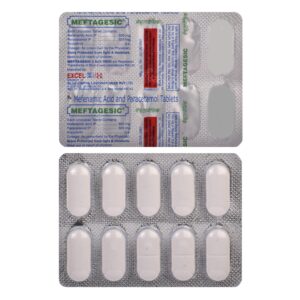PARACETAMOL (ACETAMENOPHEN) + MEFENAMIC ACID
Paracetamol (acetamenophen): Paracetamol, also known as acetaminophen, is a commonly used over-the-counter medication for pain relief and fever reduction. It belongs to the class of drugs known as analgesics and antipyretics.
Paracetamol works by inhibiting the synthesis of prostaglandins, which are substances that are produced in response to injury or illness and cause pain and fever. By reducing these prostaglandins in the central nervous system, paracetamol provides pain relief and helps to lower body temperature.
Paracetamol is primarily used to treat mild to moderate pain, such as headaches, muscle aches, toothaches, and menstrual cramps. It is also effective in reducing fever associated with various conditions, including the common cold and flu.
The recommended dose of paracetamol for adults is usually 500-1000 milligrams (mg) every 4-6 hours, with a maximum daily dose of 4000 mg. It is important to follow the dosing instructions on the product label or as directed by a healthcare professional.
While generally considered safe when used as directed, paracetamol can cause side effects in some individuals. Common side effects include nausea, upset stomach, and allergic reactions like skin rash or itching. Rarely, it can cause severe allergic reactions or liver damage, especially with high doses or long-term use. Overdose of paracetamol can be life-threatening and may cause liver failure.
It is essential to take paracetamol as directed and avoid combining it with other medications that also contain paracetamol, as this can lead to an accidental overdose. It is always recommended to consult with a healthcare professional before starting any new medication.
Mefenamic Acid: Mefenamic Acid is a nonsteroidal anti-inflammatory drug (NSAID) that is used to relieve pain and inflammation. It is commonly prescribed to treat menstrual cramps (dysmenorrhea), as well as mild to moderate pain caused by various conditions such as arthritis, dental pain, and postoperative pain.
The mechanism of action of Mefenamic Acid involves inhibiting the production of prostaglandins, which are substances in the body that cause pain, inflammation, and fever. By blocking the synthesis of prostaglandins, Mefenamic Acid helps reduce pain and inflammation.
The usual dose of Mefenamic Acid for adults is 500 mg initially, followed by 250 mg every 6 hours as needed. However, the dose may vary depending on the individual’s condition and response to the medication. It is important to follow the directions provided by a healthcare professional.
As with any medication, Mefenamic Acid may have potential side effects. Common side effects may include stomach pain, nausea, vomiting, diarrhea, heartburn, dizziness, and headache. Serious side effects are rare but may include allergic reactions, stomach ulcers, gastrointestinal bleeding, liver problems, and kidney problems. It is important to seek medical attention if any severe side effects are experienced.
Mefenamic Acid should be used with caution in individuals with a history of gastrointestinal disorders, liver or kidney problems, asthma, or heart conditions. It is important to inform the healthcare professional about any existing medical conditions or medications being taken before starting Mefenamic Acid.
Overall, Mefenamic Acid is an effective medication for the relief of pain and inflammation. However, it is essential to use it as prescribed and under the guidance of a healthcare professional to minimize the risk of side effects.





